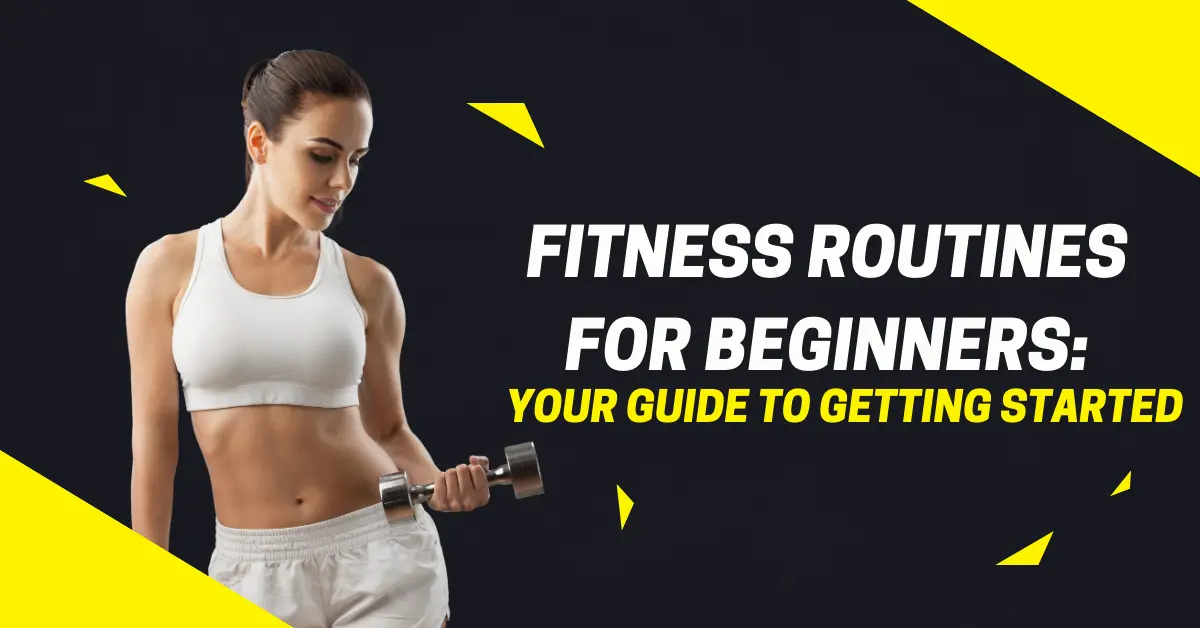
Fitness Routines for Beginners: Your Guide to Getting Started
- 127
- 0
- 0
Beginners must have a fitness routine because it helps build strength, improve health, and boost energy levels. Taking good steps, like starting slowly and setting realistic goals, prevents injury and makes exercise enjoyable. Consistency is key, so finding activities you like can keep you motivated. Additionally, creating a balanced routine that includes cardio, strength, and flexibility exercises will give you overall fitness benefits. Remember, making these positive changes now sets a solid foundation for a healthier future.
Fitness Routines for Beginners
Starting fitness routines for beginners is a great way to improve your health. Begin with simple exercises like walking, stretching, or light jogging for about 20-30 minutes a few times a week. Gradually add strength training with bodyweight exercises, such as push-ups and squats, two to three times weekly. Pay attention to your body and take breaks when necessary. Staying hydrated and eating healthy foods will support your fitness journey.
If you’re new to working out and want to start a fitness routine, you’re in the right place. We know getting started can feel overwhelming, but don’t worry – we’re here to help. This guide will walk you through everything you need to know to begin your fitness journey & fitness routines for beginners.
Why Start a Fitness Routine?
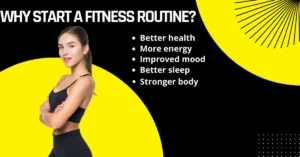
Before we jump into the how-to’s, let’s talk about why fitness is important:
- Better health: Regular exercise can lower your risk of many diseases.
- More energy: Working out gives you more energy for daily life.
- Improved mood: Exercise releases feel-good chemicals in your brain.
- Better sleep: Regular activity can help you sleep more soundly.
- Stronger body: You’ll build muscle and get stronger over time.
Getting Started: The Basics
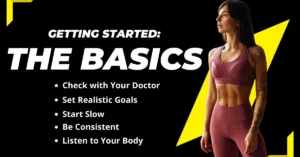
Check with Your Doctor
If you haven’t exercised in a while or have any health concerns, it’s a good idea to talk to your doctor before starting a new fitness routine. They can give you the all-clear and maybe even some helpful tips.
Set Realistic Goals
Think about what you want to achieve. Do you want to get stronger? Lose weight? Have more energy? Establishing specific, attainable goals will keep you motivated.
Start Slow
Remember, you’re just beginning. It’s okay to start with short, easy workouts and build up over time. Pushing too hard too fast can lead to burnout or injury.
Be Consistent
Aim to exercise regularly. Even short workouts done consistently are better than occasional long ones.
Listen to Your Body
Pay attention to how you feel. Some muscle soreness is normal when you start, but stop if you feel pain.
Types of Exercise
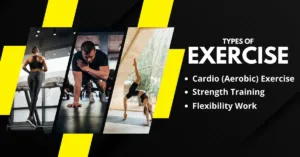
A well-rounded fitness routine includes three main types of exercise:
- Cardio (Aerobic) Exercise
- Strength Training
- Flexibility Work
Let’s examine each of these more closely.
Cardio Exercise
Cardio gets your heart rate up and makes you breathe harder. It’s great for your heart and lungs and can help you burn calories.
Beginner-friendly cardio exercises:
- Walking
- Swimming
- Cycling (on a regular bike or stationary bike)
- Dancing
- Low-impact aerobics
Start with 10-15 minutes of cardio, 3 times a week. Gradually increase the time as you get fitter.
Strength Training
Strength training helps build muscle, which can boost your metabolism and make daily tasks easier.
Beginner-friendly strength exercises:
- Bodyweight squats
- Push-ups (you can do these against a wall to start)
- Lunges
- Plank holds
- Dumbbell curls
Start with 1 set of 8-12 repetitions for each exercise, 2-3 times a week. As you get stronger, you can add more sets or use heavier weights.
Flexibility Work
Stretching helps keep your muscles flexible, which can prevent injuries and reduce muscle soreness.
Beginner-friendly flexibility exercises:
- Toe touches
- Arm circles
- Leg swings
- Neck rolls
- Child’s pose (a yoga position)
Try to stretch for 5-10 minutes after each workout, holding each stretch for 15-30 seconds.
Sample Weekly Routine for Beginners
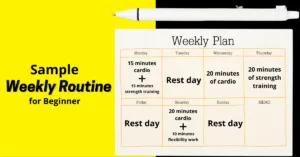
Here’s an example of how you might structure your week:
- Monday: 15 minutes cardio + 15 minutes strength training
- Tuesday: Rest day
- Wednesday: 20 minutes of cardio
- Thursday: 20 minutes of strength training
- Friday: Rest day
- Saturday: 20 minutes cardio + 10 minutes flexibility work
- Sunday: Rest day
Remember, this is just an example. You can modify it to suit your schedule and objectives.
Equipment for Beginners
You don’t require expensive equipment to begin exercising. Here are some basics that can be helpful:
- Comfortable clothes
- Supportive shoes
- Water bottle
- Yoga mat (for floor exercises and stretching)
- Light dumbbells (1-5 pounds to start)
As you progress, you might want to add more equipment, but these basics are enough to get started.
Nutrition Basics
Exercise is just part of the picture. What you eat also plays a big role in your fitness. Here are some simple nutrition tips:
- Eat plenty of fruits and vegetables
- Choose whole grains over refined grains
- Include lean proteins in your diet
- Stay hydrated – drink water throughout the day
- Limit processed foods and sugary drinks
Remember, you don’t need to change everything at once. Gradual, small adjustments are usually more sustainable.
Common Mistakes to Avoid
As a beginner, it’s easy to make some common mistakes. Here’s what to watch out for:
- Overdoing it too quickly can result in burnout or injury.
- Skipping warm-ups: Always take 5-10 minutes to warm up before exercising.
- Not resting enough: Your body needs time to recover between workouts.
- Comparing yourself to others: Everyone’s fitness journey is different.
- Expecting instant results: Changes take time – be patient with yourself.
Staying Motivated
Starting a new fitness routine is exciting, but keeping it up can be challenging. Here are some tips to stay motivated:
- Monitor your progress by maintaining a workout journal or utilizing a fitness app.
- Treat yourself: Establish small goals and celebrate when you achieve them.
- Find a workout buddy: Having someone to exercise with can make it more fun.
- Variety is key: Experiment with various types of exercise to maintain excitement.
- Be kind to yourself: If you miss a workout, don’t worry. Simply return to your routine the following day.
When to Consider a Personal Trainer
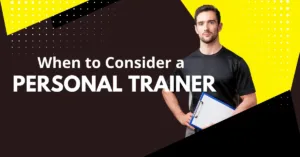
If you’re feeling unsure about proper form or how to progress, a personal trainer can be really helpful. They can:
- Show you how to do exercises correctly
- Help you create a personalized workout plan
- Keep you accountable
- Offer encouragement and support
Many gyms offer a free session with a trainer when you join. This can be a great way to get some professional guidance as you start your fitness journey.
Tracking Your Progress
It’s important to keep track of your progress. This can keep you motivated and show you how much progress you’ve made. Some ways to track progress:
- Take measurements: Measure your waist, hips, arms, and thighs once a month.
- Track your workouts: Note what exercises you do, for how long, and how they feel.
- Take progress photos: Sometimes changes are easier to see in photos than in the mirror.
- Pay attention to how you feel: Are everyday tasks getting easier? Do you have more energy?
Remember, progress isn’t just about weight or how you look. Feeling stronger, having more energy, and improving your overall health are all important signs of progress.
Conclusion
Starting a fitness routine might seem daunting, but remember – every expert was once a beginner. The most important thing is to start and to keep going. Be patient with yourself, celebrate small victories, and don’t be afraid to adjust your routine as you learn what works best for you.
Remember these key points:
- Start slow and build up gradually
- Incorporate a combination of cardio, strength training, and flexibility exercises.
- Be consistent
- Eat a balanced diet
- Stay hydrated
- Listen to your body
- Track your progress
- Stay motivated
You’ve made the first move by going through this guide. Now it’s time to put what you’ve learned into action. You’ve got this. Good luck on your fitness journey.
FAQs
1. How often should I work out as a beginner?
Start with 2-3 workouts a week, each lasting about 20-30 minutes. This gives your body time to adjust. As you get stronger and fitter, you can slowly add more days or make your workouts longer.
2. Do I need to join a gym to start exercising?
Not at all! You can start at home with bodyweight exercises, walking, or online workout videos. Gyms offer more equipment and classes, but they’re not necessary for beginners. Select what feels most comfortable to you.
3. Is it common to experience soreness after exercising?
Yes, some soreness is normal, especially when you’re new to exercise. It’s called Delayed Onset Muscle Soreness (DOMS). If the pain is sharp or lasts more than a few days, talk to a doctor.
4. How long before I see results from working out?
Everyone’s different, but you might start feeling better (more energy, better sleep) in a few weeks. Physical changes, like getting stronger or losing weight, usually take a few months of regular exercise.
5. What should I consume before and after exercising?
Before: A light snack with carbs and protein, like a banana with peanut butter. After: A meal with protein to help muscles recover, and carbs to replace energy. Always stay hydrated by drinking water before, during, and after your workout.
Also Read:
How to Build a Consistent Fitness Routine
Beginner’s Guide to Starting a Fitness Journey
References:
https://www.center4research.org/beginners-guide-developing-exercise-routine/
https://www.ncbi.nlm.nih.gov/pmc/articles/PMC8449772/
https://en.wikipedia.org/wiki/General_fitness_training
Disclaimer: The fitness routines outlined in this blog are intended for informational purposes only and should not replace professional guidance. Consult a healthcare provider or fitness expert before starting any new exercise program, especially if you have pre-existing health conditions.
Related post

7 Health Benefits of Assam Tea


